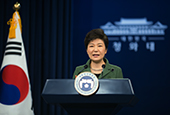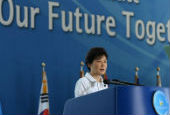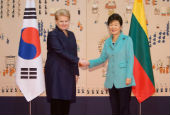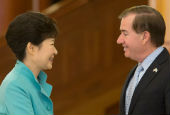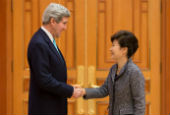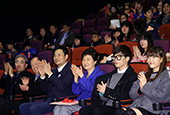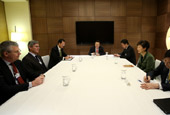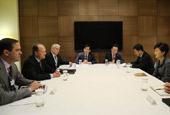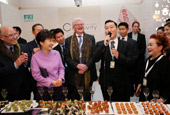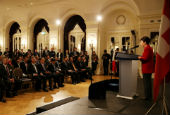-
 Korea.net's 24-hour YouTube channel
Korea.net's 24-hour YouTube channel- NEWS FOCUS
- ABOUT KOREA
- EVENTS
- RESOURCES
- GOVERNMENT
- ABOUT US
“My goal in politics is to usher in an era of happiness for the people,” said President Park Geun-hye on February 25, announcing her Three Year Plan for Economic Innovation on the first anniversary of her inauguration. In the announcement, she stressed that her goal is to build an economy based on strong fundamentals that will launch an era of happiness for the people.
“With our Three Year Plan for Economic Innovation, we will raise Korea’s potential economic growth rate back to over 4 percent, which is otherwise expected to fall to 3 percent by 2017, achieve an employment rate of 70 percent and lay the foundation so that we can go beyond a gross domestic product (GDP) per capita of $30,000 and reach $40,000,” the president said.
President Park said that the three key goals of her economic plan are, “an economy characterized by strong fundamentals, dynamic innovation and a balance between domestic demand and exports.”
“I will personally make sure that strategies to accomplish all three goals are successfully implemented during my tenure,” Park said, listing three core tasks for each goal.
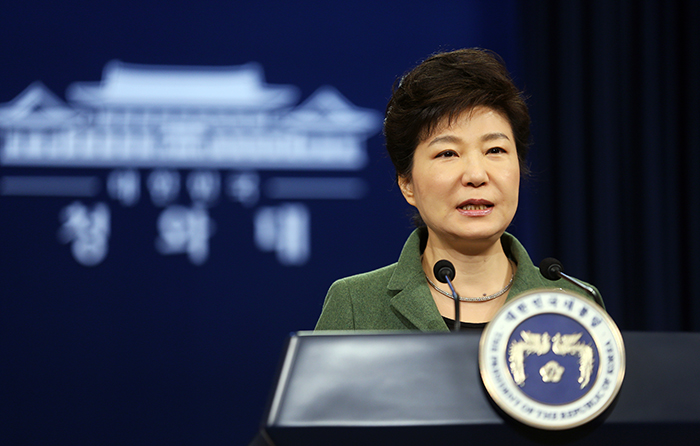
○ An economy based on strong fundamentals
“To build an economy based on strong fundamentals we must begin by correcting abnormal systems and practices,” Park said. “The three goals which must be accomplished in order to build an economy based on strong fundamentals are: public sector reform; develop a market economy based on principles; and build a strong social safety net.”
Speaking about reforming the public sector, President Park said, “For a long time now, the public sector has been stuck with abnormal practices and low productivity. The largest abnormal practices lie in lax management, a high debt ratio and various types of fraud.”
As for details, President Park said public institutions will need to disclose all information, except for confidential information and business secrets, sell assets to pay back their debt and that a ceiling will be imposed on the total amount of bonds they issue. Debt ratios of public institutions will be lowered drastically and the vicious cycle of structural corruption and unfair practices will be severed. For that purpose, institutions found with procurement irregularities will be forced to outsource their purchase activities to the Public Procurement Service for two years, in a system called “One Strike Out.” Also, companies that hire executive retirees from public institutions will be banned for two years from signing contracts with the public institutions where their new employees used to work. The president said the government will also amend laws related to three public pensions and improve related regulations. The government will also merge or abolish similar projects or businesses, she said.
To develop a market economy based on principles, President Park said, “When economic entities, such as large companies, small- and medium-sized enterprises (SMEs), employers, employees, producers and consumers stick to principles and reward each other fairly, in line with the amount of effort they have made, everybody will be able to do their best and their unity will lead to improved competitiveness of the entire country.”
Park also said she would eradicate unfair practices, refuse to settle for the status quo and eliminate outdated systems and practices in the labor market which distort the economy and put a restraint on innovation in the private sector.
Concerning the social safety net, President Park said, “A social safety net is the most important foundation that keeps the Korean economy stable against various shocks.”
The president said that to establish a social safety net, the range of people entitled for employment insurance and for ”growing hope bank accounts,” a form of government aid, must be expanded, unemployment allowances must be raised and government incentives for employment must increase.
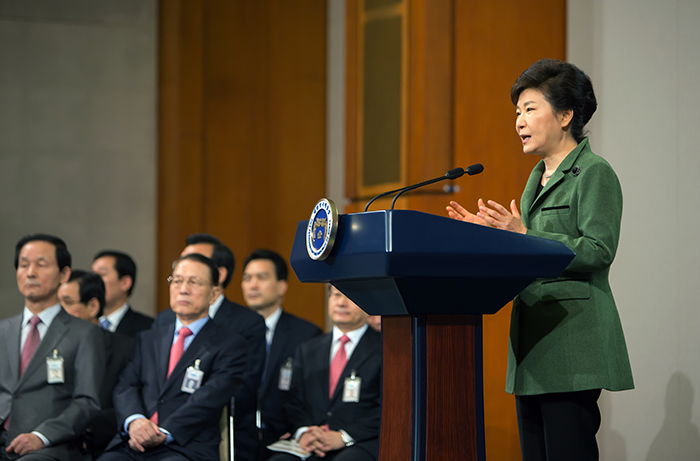
○ An economy based on dynamic innovation
President Park said the traditional way of Korean economic growth has reached its limit and that the country now needs new ideas and a change of paradigm in order to overcome its limitations. To accomplish this second goal, the president proposed three agenda items: develop the creative industries, invest for the future and make inroads into overseas markets.
Park said that by 2015, innovation centers for creative industries will be established in 17 major cities across the country in a bid to quickly develop those industries.
“The innovation centers for the creative industries will be at the core of developing a creative economy, as well as developing regional economies and helping to make a cradle that will nurture human resources. For that purpose, we will combine the abilities of the central government, the regional governments and the private sector,” Park said.
In addition to the innovation centers, a “technology bank” will be established in order to help develop the creative industries. The “technology bank” will be assigned to collect unused ideas, patents and knowhow held by government research institutions and companies and help their transfer to those in need of such intangible assets, like entrepreneurs and startup companies.
“The government will increase the amount of startup funds available for young entrepreneurs and angel investment funds to KRW 760 billion, and also put KRW 200 billion together with global venture capital companies into a new fund similar to Israel’s Yozma Fund, to help Korean startups,” the president said. “Korea has strengths in science and technology, information and communication technology (ICT) and cultural content, which are the vitamins of a creative economy. We will expand our ‘creative economy vitamin project,’ which combines ICT with traditional industries, so that it covers some 120 projects over the next three years.”
President Park also stressed that to build an economy based on dynamic innovation, it is just as important to invest for the future and to make inroads into overseas markets.
“We will raise research and development spending to 5 percent of GDP to improve the country’s science and technology capacity, on which the creative industries are based. We will also introduce a ‘Korea research fellowship’ where 300 world-class scientists and researchers will be invited to Korea to support the country’s economic growth and to help raise the R&D capability of local universities,” the president said.
“The government will also grant more tax breaks on capital gains from technology transfers in a bid to boost trade in intellectual property rights,” Park added.
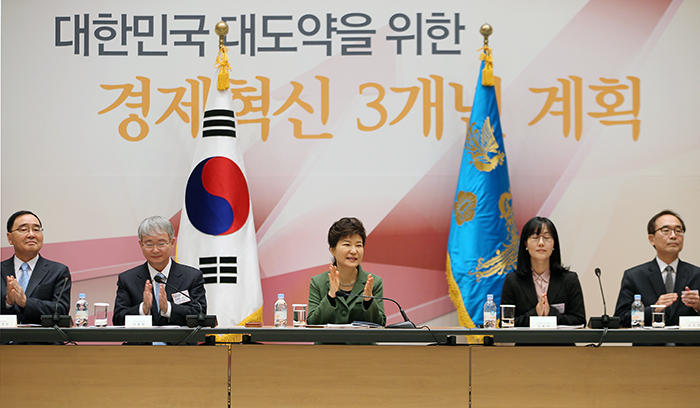
○ An economy that balances between domestic demand and exports
The third goal of the president’s plan is to pursue economic growth while balancing between domestic demand and exports.
“For the Korean economy to have stable and continuous growth, domestic demand and exports, a manufacturing industry and a services industry, large companies and SMEs, metropolitan areas and other regions, the country should grow in a balanced way. The fruits of the growth should be distributed equally to the public,” President Park said.
President Park mentioned the high level of household debt and the rise in required key money deposits as the biggest barriers to the expansion of domestic demand. She spoke of deregulation as a solution to improve investment conditions.
“Deregulation is the only way to increase investment without increasing government spending,” Park said. “We will reduce the number of regulations, which are the biggest barrier to investment.”
President Park said that creating jobs is a key policy to increasing domestic demand and that the government will help create 500,000 jobs for young people and 1.5 million jobs for women who have taken time off work for pregnancy or childcare.
The president concluded by saying that, “The government will perfectly implement the Three-Year Plan for Economic Innovation with utmost effort, and we will usher in an era of happiness for the people.”
“We will let the public know in a clear and orderly manner about the progress we’re making on the three-year plan and we will proceed without fail as our countrymen watch with understanding and interest.”
Click here to see the address by President Park Geun-hye on the Three-year Plan for Economic Innovation
By Jeon Han, Limb Jae-un
Korea.net staff writers
hanjeon@korea.kr

“With our Three Year Plan for Economic Innovation, we will raise Korea’s potential economic growth rate back to over 4 percent, which is otherwise expected to fall to 3 percent by 2017, achieve an employment rate of 70 percent and lay the foundation so that we can go beyond a gross domestic product (GDP) per capita of $30,000 and reach $40,000,” the president said.
President Park said that the three key goals of her economic plan are, “an economy characterized by strong fundamentals, dynamic innovation and a balance between domestic demand and exports.”
“I will personally make sure that strategies to accomplish all three goals are successfully implemented during my tenure,” Park said, listing three core tasks for each goal.

President Park Geun-hye announces her Three-Year Plan for Economic Innovation on February 25, marking the first anniversary of her inauguration. (photo: Cheong Wa Dae)
○ An economy based on strong fundamentals
“To build an economy based on strong fundamentals we must begin by correcting abnormal systems and practices,” Park said. “The three goals which must be accomplished in order to build an economy based on strong fundamentals are: public sector reform; develop a market economy based on principles; and build a strong social safety net.”
Speaking about reforming the public sector, President Park said, “For a long time now, the public sector has been stuck with abnormal practices and low productivity. The largest abnormal practices lie in lax management, a high debt ratio and various types of fraud.”
As for details, President Park said public institutions will need to disclose all information, except for confidential information and business secrets, sell assets to pay back their debt and that a ceiling will be imposed on the total amount of bonds they issue. Debt ratios of public institutions will be lowered drastically and the vicious cycle of structural corruption and unfair practices will be severed. For that purpose, institutions found with procurement irregularities will be forced to outsource their purchase activities to the Public Procurement Service for two years, in a system called “One Strike Out.” Also, companies that hire executive retirees from public institutions will be banned for two years from signing contracts with the public institutions where their new employees used to work. The president said the government will also amend laws related to three public pensions and improve related regulations. The government will also merge or abolish similar projects or businesses, she said.
To develop a market economy based on principles, President Park said, “When economic entities, such as large companies, small- and medium-sized enterprises (SMEs), employers, employees, producers and consumers stick to principles and reward each other fairly, in line with the amount of effort they have made, everybody will be able to do their best and their unity will lead to improved competitiveness of the entire country.”
Park also said she would eradicate unfair practices, refuse to settle for the status quo and eliminate outdated systems and practices in the labor market which distort the economy and put a restraint on innovation in the private sector.
Concerning the social safety net, President Park said, “A social safety net is the most important foundation that keeps the Korean economy stable against various shocks.”
The president said that to establish a social safety net, the range of people entitled for employment insurance and for ”growing hope bank accounts,” a form of government aid, must be expanded, unemployment allowances must be raised and government incentives for employment must increase.

President Park Geun-hye says her Three-Year Plan for Economic Innovation will raise Korea’s potential growth rate to over 4 percent, in an announcement made on the first anniversary of her inauguration. (photo: Cheong Wa Dae)
○ An economy based on dynamic innovation
President Park said the traditional way of Korean economic growth has reached its limit and that the country now needs new ideas and a change of paradigm in order to overcome its limitations. To accomplish this second goal, the president proposed three agenda items: develop the creative industries, invest for the future and make inroads into overseas markets.
Park said that by 2015, innovation centers for creative industries will be established in 17 major cities across the country in a bid to quickly develop those industries.
“The innovation centers for the creative industries will be at the core of developing a creative economy, as well as developing regional economies and helping to make a cradle that will nurture human resources. For that purpose, we will combine the abilities of the central government, the regional governments and the private sector,” Park said.
In addition to the innovation centers, a “technology bank” will be established in order to help develop the creative industries. The “technology bank” will be assigned to collect unused ideas, patents and knowhow held by government research institutions and companies and help their transfer to those in need of such intangible assets, like entrepreneurs and startup companies.
“The government will increase the amount of startup funds available for young entrepreneurs and angel investment funds to KRW 760 billion, and also put KRW 200 billion together with global venture capital companies into a new fund similar to Israel’s Yozma Fund, to help Korean startups,” the president said. “Korea has strengths in science and technology, information and communication technology (ICT) and cultural content, which are the vitamins of a creative economy. We will expand our ‘creative economy vitamin project,’ which combines ICT with traditional industries, so that it covers some 120 projects over the next three years.”
President Park also stressed that to build an economy based on dynamic innovation, it is just as important to invest for the future and to make inroads into overseas markets.
“We will raise research and development spending to 5 percent of GDP to improve the country’s science and technology capacity, on which the creative industries are based. We will also introduce a ‘Korea research fellowship’ where 300 world-class scientists and researchers will be invited to Korea to support the country’s economic growth and to help raise the R&D capability of local universities,” the president said.
“The government will also grant more tax breaks on capital gains from technology transfers in a bid to boost trade in intellectual property rights,” Park added.

President Park Geun-hye applauds during the fourth National Economic Advisory Council and Economic Ministers’ Meeting on February 25, the first anniversary of her inauguration. (photo: Cheong Wa Dae)
○ An economy that balances between domestic demand and exports
The third goal of the president’s plan is to pursue economic growth while balancing between domestic demand and exports.
“For the Korean economy to have stable and continuous growth, domestic demand and exports, a manufacturing industry and a services industry, large companies and SMEs, metropolitan areas and other regions, the country should grow in a balanced way. The fruits of the growth should be distributed equally to the public,” President Park said.
President Park mentioned the high level of household debt and the rise in required key money deposits as the biggest barriers to the expansion of domestic demand. She spoke of deregulation as a solution to improve investment conditions.
“Deregulation is the only way to increase investment without increasing government spending,” Park said. “We will reduce the number of regulations, which are the biggest barrier to investment.”
President Park said that creating jobs is a key policy to increasing domestic demand and that the government will help create 500,000 jobs for young people and 1.5 million jobs for women who have taken time off work for pregnancy or childcare.
The president concluded by saying that, “The government will perfectly implement the Three-Year Plan for Economic Innovation with utmost effort, and we will usher in an era of happiness for the people.”
“We will let the public know in a clear and orderly manner about the progress we’re making on the three-year plan and we will proceed without fail as our countrymen watch with understanding and interest.”
Click here to see the address by President Park Geun-hye on the Three-year Plan for Economic Innovation
By Jeon Han, Limb Jae-un
Korea.net staff writers
hanjeon@korea.kr
Related Contents
Most popular
- China warmly welcomes first Korea-born giant panda Fu Bao
- First hearing-impaired K-pop act hopes for 'barrier-free world'
- Novelist Hwang's 'Mater 2-10' shortlisted for Int'l Booker Prize
- Expats could account for 7% of population in 20 years: report
- Nat'l Fire Agency picks 137 elite staff for deployment abroad









